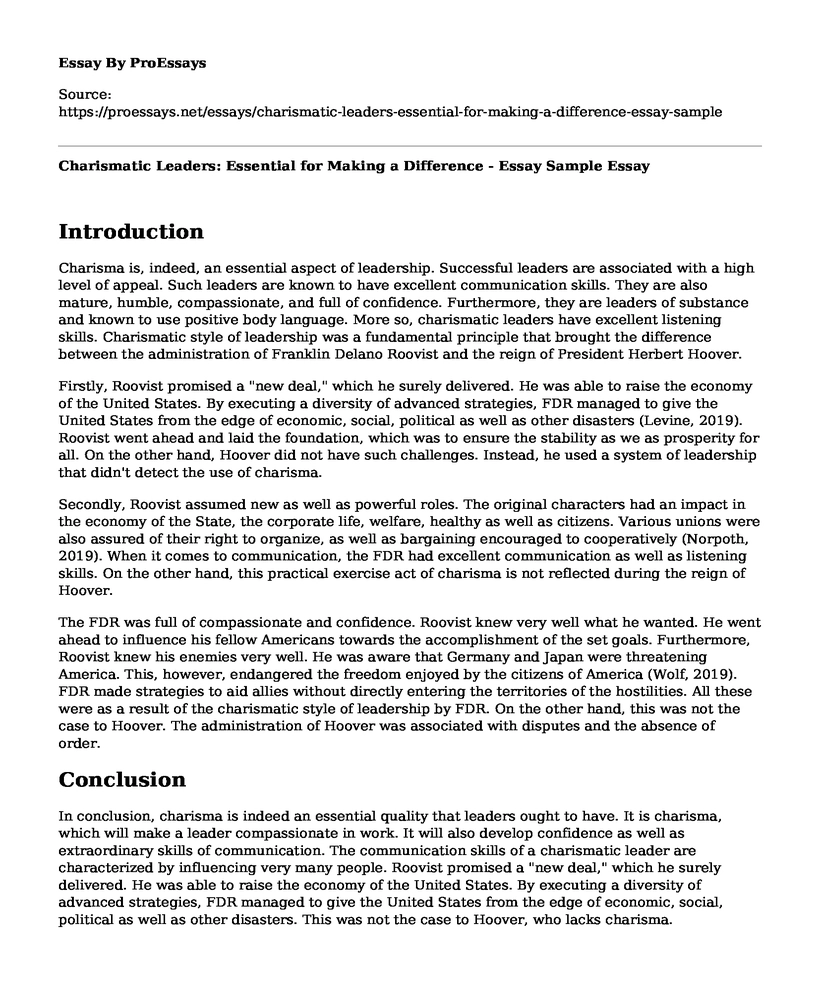Introduction
Charisma is, indeed, an essential aspect of leadership. Successful leaders are associated with a high level of appeal. Such leaders are known to have excellent communication skills. They are also mature, humble, compassionate, and full of confidence. Furthermore, they are leaders of substance and known to use positive body language. More so, charismatic leaders have excellent listening skills. Charismatic style of leadership was a fundamental principle that brought the difference between the administration of Franklin Delano Roovist and the reign of President Herbert Hoover.
Firstly, Roovist promised a "new deal," which he surely delivered. He was able to raise the economy of the United States. By executing a diversity of advanced strategies, FDR managed to give the United States from the edge of economic, social, political as well as other disasters (Levine, 2019). Roovist went ahead and laid the foundation, which was to ensure the stability as we as prosperity for all. On the other hand, Hoover did not have such challenges. Instead, he used a system of leadership that didn't detect the use of charisma.
Secondly, Roovist assumed new as well as powerful roles. The original characters had an impact in the economy of the State, the corporate life, welfare, healthy as well as citizens. Various unions were also assured of their right to organize, as well as bargaining encouraged to cooperatively (Norpoth, 2019). When it comes to communication, the FDR had excellent communication as well as listening skills. On the other hand, this practical exercise act of charisma is not reflected during the reign of Hoover.
The FDR was full of compassionate and confidence. Roovist knew very well what he wanted. He went ahead to influence his fellow Americans towards the accomplishment of the set goals. Furthermore, Roovist knew his enemies very well. He was aware that Germany and Japan were threatening America. This, however, endangered the freedom enjoyed by the citizens of America (Wolf, 2019). FDR made strategies to aid allies without directly entering the territories of the hostilities. All these were as a result of the charismatic style of leadership by FDR. On the other hand, this was not the case to Hoover. The administration of Hoover was associated with disputes and the absence of order.
Conclusion
In conclusion, charisma is indeed an essential quality that leaders ought to have. It is charisma, which will make a leader compassionate in work. It will also develop confidence as well as extraordinary skills of communication. The communication skills of a charismatic leader are characterized by influencing very many people. Roovist promised a "new deal," which he surely delivered. He was able to raise the economy of the United States. By executing a diversity of advanced strategies, FDR managed to give the United States from the edge of economic, social, political as well as other disasters. This was not the case to Hoover, who lacks charisma.
References
Levine, M. (2019). Herbert Hoover and the Problem of American Indians. Across the Bridge: The Merrimack Undergraduate Research Journal, 1(1), 4.
Norpoth, H. (2019). The American Voter in 1932: Evidence from a Confidential Survey. PS: Political Science & Politics, 52(1), 14-19.
Wolf, C. (2019). Fritz Kuhn's Nazi America: Kuhn's Growth and Destruction of the German American Bund in the 1930s (Doctoral dissertation, University of Kansas, Department of History).
Cite this page
Charismatic Leaders: Essential for Making a Difference - Essay Sample. (2023, Feb 27). Retrieved from https://proessays.net/essays/charismatic-leaders-essential-for-making-a-difference-essay-sample
If you are the original author of this essay and no longer wish to have it published on the ProEssays website, please click below to request its removal:
- Project Management Decisions Essay
- The Importance of Groups to Christian Leadership Essay
- Eliminating Gender Bias in the Workplace Paper Example
- Critical Review of "Hustle as a Strategy" Article Paper Example
- VA MISSION Act of 2018 Paper Example
- Essay Sample on Team Building: Appreciate, Understand, Develop & Maximize Team Performance
- Paper Example on Women Leaders: Breaking Through the Glass Ceiling







